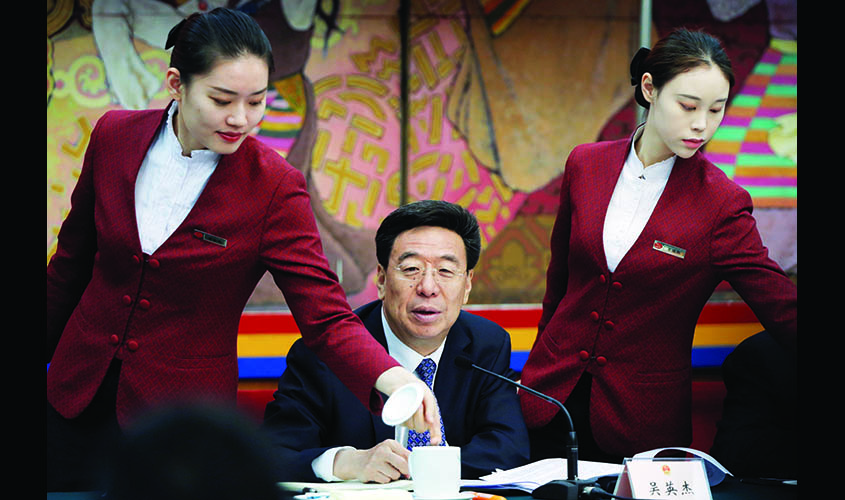TAR Party secretary urged cadres to continue the fight against the ‘Dalai clique’ for stability.
NEW DELHI: Over the past many months the Chinese authorities have stepped up efforts to diminish and undermine the XIVth Dalai Lama’s influence over Tibetans inside China. This year is, additionally, marked by a number of anniversaries in China’s political calendar including the 70th year of the founding of the People’s Republic of China (PRC) in October, the founding anniversary of the People’s Liberation Army Navy (PLAN) in April, as well as the sensitive 30th anniversary of the Tiananmen “incident” in June and the 60th anniversary of the XIVth Dalai Lama’s flight from Tibet on 10 March. The latter two would be cause for the most unease to the Chinese leadership. The current strain in Sino-US relations has added to Beijing’s worries.
Despite the investment of billions of dollars in development of the Tibet Autonomous Region (TAR) and further tightening of already stringent security measures in Tibetan populated areas, the Tibetans continue to be restive with occasional incidents of protest and self-immolation. Attention of the Chinese leadership will particularly be focused on the Dalai Lama’s annual message to Tibetans on 10 March, Sunday. This coincides with the 10-day plenary session of the National People’s Congress—loosely called China’s parliament—underway in Beijing since 5 March.
Contributing to Beijing’s increased nervousness is the apprehension in Chinese Communist Party (CCP) leadership echelons that the US plans to resume support to the Tibetans. This is reinforced by indicators that the Dalai Lama continues to be venerated by Tibetans in China.
Wu Sikang, director of the Policy Research Office of the Shenzhen Municipal Government, penned an “internal” report last October after a study visit to the US in August 2018, which was particularly critical of the US. He specifically noted that the US had, after a hiatus of some years, increased financial assistance to Tibetans from this year to US$17 million. In reality, though, the overall quantum of US financial assistance has not increased in the past couple of years, but the amount allocated for Tibet related activities in India and Nepal have this year been doubled from US$3 million to US$6 million. This has aroused Beijing’s suspicions and its concern is reflected in the enhanced attention being paid to Nepal. China has for long apprehended that Nepal would be used by “hostile foreign powers” as a launch pad for anti-China activities by Tibetans inside the Tibet Autonomous Region (TAR).
Reflecting these concerns, the TAR Publicity Department of the Regional Commission for Discipline Inspection on 1 February 2019, released a 46-minute, four-part video, which was aired on Tibet Television from 28 to 31 January. It highlighted that Party officials having religious beliefs or involved in “separatism” or corruption were punished. The report bluntly accused some “two-faced” people in Tibet of claiming loyalty to the Party while secretly sympathising with and even working for “separatists”. It was not clear how many Party members were exposed and punished and for what specific violations, though the video revealed that a total of 215 people had been punished as of October 2018. Xiong Kunxin, an ethnic studies professor at Tibet University in Lhasa was, however, quoted saying the regional government had already identified these people and was strengthening regulations to dismiss them.
Earlier on 29 January, ahead of the Tibetan New Year “Losar”, the Executive Vice-Chairman of the TAR Party Committee, inspected Lhasa’s two most well-known monasteries of Drepung and Gaden. Here he emphasised that “Tibet’s stability is vital to national stability, and maintaining Tibet’s security is akin to safeguarding national security.”
Separately, the TAR authorities announced on 22 January 22, that a new training camp had opened in Shigatse in Tibet under paramilitary supervision to “correct” and “mould” the thinking of Party cadres. It has been tasked to carry out political “education” in the broader Tibetan society. There was also an announcement that a large “Tibet Youth Palace” will be opened in Lhasa in May 2019 to strengthen “patriotic education” among young people.
Meanwhile, a special high-level meeting was convened at the TAR Party School in Lhasa on 21 February to discuss how to prevent major risks to “national sovereignty” and security. Senior TAR leaders attended, including the chairman of the TAR People’s Government, commander of the PLA garrison in Tibet and the head of TAR’s security apparatus. The seminar was addressed by TAR Party secretary Wu Yingjie. He urged cadres to cooperate with the Party in times of “new problems” and “new challenges” and called on them to intensify the “anti-separatist struggle”, proactively take social stability—an euphemism for security measures—initiatives to dilute the “negative influence of religion”, continue the fight against the “Dalai clique” and achieve sustainable long-term stability. He asserted, in this context, the importance of accelerating construction of “well-off” border villages. Wu Yingjie has made a direct critical reference to the “Dalai clique” after a long time!
The Chinese appointed Panchen Lama, Gyaltsen Norbu, continues to be co-opted in the effort. At a symposium on the 30th anniversary of the 10th Panchen Lama organised by the China Tibetology Research Centre on 3 February, Gyaltsen Norbu, highlighted the 10th Panchen Lama’s dedication to China and unwavering confidence in the Communist Party. He claimed that “separatist forces”—namely the Dalai Lama and Tibetans abroad—were distorting and misusing the speeches of the 10th Panchen Lama. He accused
Jay Ranade is a former Additional Secretary in the Cabinet Secretariat, Government of India and is presently President of the Centre for China Analysis and Strategy.

